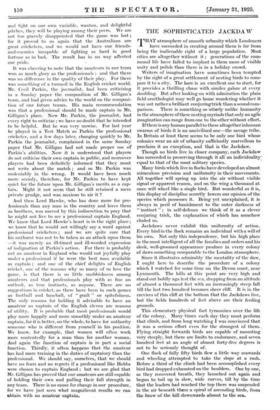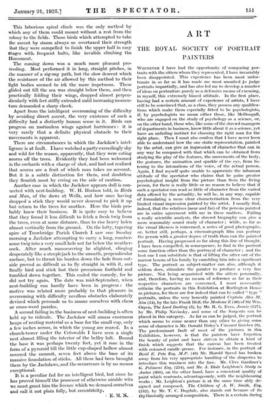THE .SOPHISTICATED JACKDAW
THAT atmosphere of smooth urbanity which Londoners have succeeded in creating around them is far from being the inalienable right of a large -population. Most cities are altogether without it ; generations of the com- munal life have failed to implant in them more of visible unity and polish than there is in a holiday crowd.
Writers of imagination have sometimes been' tempted by the sight of a great settlement of nesting birds to com pare it to a city. The hare is an excellent one to start, for it provides a thrilling chase with similes galore at every doubling. But after looking on with admiration the plain field ornithologist may well go home wondering whether it was not rather a brilliant conjuringtrick than a sound-com- parison. There is „something so utterly unlike ,humanity in the atmosphere of these nesting myriads that only an agile imagination can range from one to the other without effort.
If there is any human parallel to these altogether inhuman swarms of birds it is an uncivilized one—the savage tribe. In Britain at least there seems to be only one bird whose colonies wear an air of urbanity sufficiently marvellous to proclaim it an exception, and that is the Jackdaw.
Though no birds live in closer company, each Jackdaw has succeeded in preserving through-it all an individuality' equal to that of the most solitary species.
Many birds which live in flocks have developed-an almost miraculous precision and uniformity in-their movements. All together will -spring up into the air without visible signal or apparent reason, and on the wing a thousand at once will 'wheel like a single bird. But wonderful as it is, this display of discipline secretly lowers our opinion of the species which possesses it. Being -yet unexplained, it is always in peril of banishment to the outer darkness of " instinct " ; • in self-defence we think of it as a clever conjuring trick, the explanation of which has somehow eluded us.
Jackdaws never exhibit this uniformity of action. Every bird in the flock remains an individual with a will of his own. Not only this independence, but his high place in the most intelligent of all the families and orders and his sleek, well-groomed appearance produce in every colony of daws something comparable to the London atmosphere.
Since it illustrates admirably the mentality of the daw, I ought here to describe the procedure of a colony Which I watched for some time on the Devon coast, near Lynmouth. The hills at this point are very high and stand out boldly against the sea, dropping from an altitude • of almost a thousand feet with an increasingly steep fall till the last two hundred becomes sheer cliff. It is in the crevices of this cliff at the bottom that the Jackdaws live, but the fields hundreds of feet above are their feeding grounds.
This elementary physical fact tyrannizes over the life of the colony. Many times each day they must perform that climb, and from long watching I was convinced that it was a serious effort even for the strongest of them., Flying straight forwards birds are capable of mounting very steeply, but there are limits to endurance, and seven hundred feet at an angle -of almost forty-five degrees is' not to be seriously thought of.
One flock of fully fifty birds flew a little way seawards and wheeling attempted to take the slope at a rush. Before a third of the climb had been accomplished every bird had dropped exhausted on the boulders. One by one, as they recovered breath, they launched out again and began to toil up in slow, wide curves, till by the time that the leaders had reached the top there was suspended in the air beneath them a spiral of ascending birds, from the brow -of the hill downwards almost to the sea. This laborious spiral climb was the only method by which any of them could mount without a rest from the colony to the fields. Those birds which attempted to take the ascent by storm always so overtaxed their strength that they were compelled to finish the upper half in easy Stages with. frequent halts, like invalids climbing the Monument.
The coming down was a much more pleasant pro- ceeding. Most performed it in long, straight pitches, in the manner of a zig-zag' path, but the slow descent which the resistance of the air allowed• by this method to their light bodies seemed to irk the more impetuous. These glided out till the sea was straight below them, and then practically folding their wings, dropped almost perpen- dicularly with feet stiffly extended until increasing momen- tum demanded a sharp check.
Apart from the intelligent overcoming of the difficulty by avoiding direct ascent, the very existence of such a difficulty had a distinctly human sense in it. Birds can progress on motionless wings against hurricanes : it is very rarely that a definite physical obstacle to their movements is apparent.
There are circumstances in which the Jackdaw's intel- ligence is at fault. I have watched a party exceedingly shy and wild for the reason, apparently, that they were eating acorns off the trees. Evidently they had been welcomed in the orchards with a charge of shot, and had-not realized that acorns are a fruit of which man takes no account. But it is a subtle distinction for them, and doubtless they flourish most by erring on the side of caution.
Another case in which the Jackdaw appears dull is con- nected with nest-building. W. H. Hudson told, in Birds and Man, of the claws at Wells, and how once having dropped a stick they would never descend to pick it up but return to the trees for another. Here the birds pro- bably- knew their business. It is quite easy to believe that they found it less difficult to fetch a fresh twig from the trees, even at some distance, than to rise heavy laden almost vertically from the ground. On the lofty, tapering spire of Trowbridge Parish Church I saw one Sunday morning a Jackdaw attempting to carry a long, cumber- some twig into a very small hole not far below the weather- cock. After much manoeuvring he alighted, clinging desperately like a steeplejack to the smooth, perpendicular surface, but to.thrust his burden down the hole from out- side proved as difficult as_ to fly. straight in with it, and finally bird and stick lost their precarious foothold and tumbled down together. This ended the comedy, for he did not try again. The date was mid-September, when nest-building can hardly have been in progress : the motive was related more probably to that pleasure in overcoming with difficulty needless obstacles elaborately devised which persuade us to amuse ourselves with chess or cross-word puzzles.
A second failing in.the business of nest-building is often held up to ridicule. The Jackdaw will amass enormous heaps of nesting material as a base for the small cup, only a few inches across, in which the young are reared. In a church-tower under the Cotswolds I have seen a single nest almost filling the interior of the belfry loft. Round the base it was perhaps twenty feet, yet it rose in the form of a pyramid till the little cup-shaped hollow almost covered the. summit, seven • feet above the base of its massive foundation of sticks. All these had been brought there by the Jackdaws, and the occurrence is by no means exceptional. It is a peculiar fad for an intelligent bird, but since he has proved himself the possessor of otherwise nimble wits we must grant him the licence which we demand. ourselves and call it not plain folly, but eccentricity.
• E. M. N.















































 Previous page
Previous page